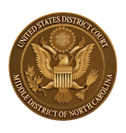Welcome to the Virtual MDNC Civics Initiative!
Why virtual?
Although we prefer for students to visit our courthouses for programs, we are able to reach more students by offering virtual programs in addition to our in-person programs. These 50-minute programs are easier for teachers to schedule and fit into one class period.
What is the Virtual MDNC Civics Initiative?
The goals of our virtual civics initiative remain the same as those of our traditional in-person initiative – to provide an opportunity for middle and high school students to broaden and deepen their understanding of the roles of the federal judiciary and the Constitution in their lives and communities.
How can schools participate?
Judge Catherine C. Eagles, Leah Garland (deputy clerk), and Jasmine Little (career law clerk) manage the Civics Initiative. To learn more about the Civics Initiative's virtual programs, please email Leah Garland.
Who can participate?
We welcome any schools throughout the Middle District of North Carolina. The programs are designed for middle and high school students who have a basic knowledge of the Bill of Rights.
What programs are offered?
We are offering the following live 50-minute programs:
- The Rule of Law and an Independent Judiciary – Why Do They Matter to You?: A federal judge leads students in a discussion about the rule of law and an independent judiciary and the impact of those principles on students’ lives and communities. A sample agenda for this program is available here.
- The Separation of Powers and an Independent Judiciary – Why Do They Matter to You?: A federal judge leads students in a discussion about the separation of powers and an independent judiciary and the impact of those principles on students’ lives and communities. A sample agenda for this program is available here.
- Let’s Talk with the Judge! A Comparison of State and Federal Courts: Students talk with a federal judge who has also served as a North Carolina state judge about the similarities and differences between the two court systems. Topics range from the steps to becoming a judge to the types of cases each court hears. A sample agenda for this program is available here.
- A School Search and Civil Discourse – Lessons from the Courtroom: A federal judge begins the program by leading the students in a discussion about civil discourse. Students then apply that concept to the courtroom, as they work with a criminal defense attorney and prosecutor to study a fictional scenario involving the search of a student at a public school. Attorneys will help students prepare an argument to present to the judge about the constitutionality of the search. A sample agenda for this program is available here.
- Free Speech in Public Schools – from Tinker to Today: A federal judge leads students in a discussion about student expression in public schools before the students participate in a scripted oral argument for Tinker with students playing the roles of attorneys and Supreme Court justices. Students apply the ruling from Tinker in a final discussion with the judge about student expression in student government, student publications, and student conduct outside of school. A sample agenda for this program is available here.
- You Have the Right to Remain Silent – the 5th Amendment and Miranda: Students briefly review the 5th Amendment and Miranda with a federal judge before working with a criminal defense attorney and prosecutor to study a factual scenario involving an incriminating statement made before Miranda rights are provided. Attorneys will help students prepare an argument to present to the judge about the constitutionality of the using the statement against the defendant. A sample agenda for this program is available here.
- Federal Sentencing – Sufficient but not Greater than Necessary: A federal judge briefly discusses the principles of federal sentencing before students work with a criminal defense attorney and prosecutor to study a fictional scenario involving the sentencing of a felon in possession of a firearm and ammunition. Attorneys will help students prepare an argument to present to the judge about the appropriate sentence. A sample agenda for this program is available here.
How many students can participate?
These virtual programs can accommodate up to approximately 30 students.
What does it cost to participate?
The court does not charge a school to participate in the Civics Initiative.
How did the Civics Initiative start?
In March 2017, our court launched its Civics Initiative as part of the Administrative Office of the U.S. Courts' nationwide civics outreach program for middle and high school students. Since then, we have worked with nearly 1,300 students from elementary, middle, high, and law schools in the Middle District of North Carolina.
